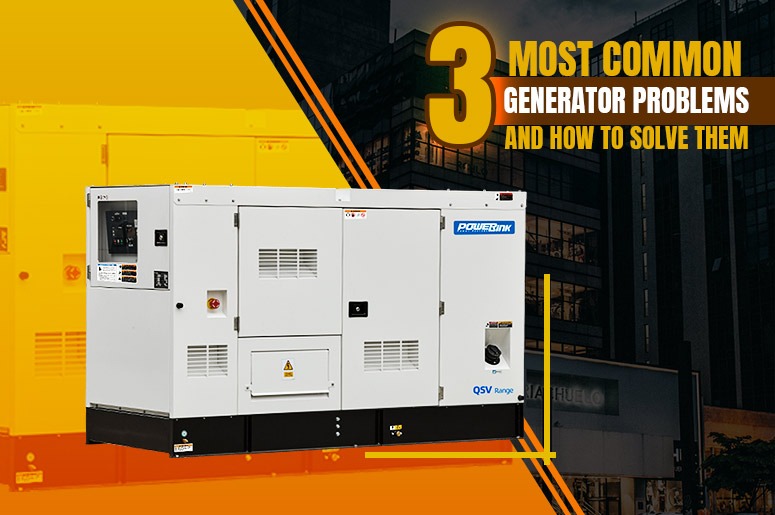
3 Most Common Generator Problems And How To Prevent Them
Owning a generator is critical, especially for households and businesses that cannot afford to lose power for even the shortest amount of time when the power grid is down. In industrial sites, it allows you to reduce downtime and prevent revenue losses. At home, it helps keep your family comfortable and avoid food spoilages. And in medical facilities, it ensures that life support equipment will continually run and preserve the life of patients and health workers. However, generator ownership also comes with a responsibility. To guarantee its sustained usefulness, you have to understand its needs. In this article, we’ve listed the 3 most common generator problems to help you avoid them and find solutions before bigger problems arise.
1. Component Issues
Several components make up a generator. When any of them does not function properly, the performance of the entire generator is affected. It may not even run at all. Wear and tear are natural for generator parts, especially with frequent use. So, it’s not surprising to encounter component faults after a while. However, with regular checks for generator electrical problems and preventive maintenance, this issue will most likely be avoided. The generator parts that need regular inspection and service include its cooling system, fuel system, lube oil system, starting mechanism, air induction and exhaust, engine monitors and control panel, oil and fuel filter, water separator, automatic transfer switch, and battery.
Imposing a maintenance plan that follows the recommendations of the manufacturer and distributor will help ensure that all the components of your generator will remain in top condition. This plan should also include an annual load bank test. This will prevent wet stacking in diesel generators by burning off excess fuel, oil, and carbon in the generator’s cylinders and exhaust. It also helps test the generator’s fuel and cooling systems and releases the moisture within.
2. Incorrect Sizing And Load

Finding the right size of generator is very important in ensuring it will consistently work properly. That’s why you must first evaluate your home or facility’s power requirements before purchasing a backup generator. Some people make the common mistake of improper generator sizing, which often leads to serious damage and wasteful inefficiencies. At least 35% of the generator’s load capacity should be utilized when it is running. Less than that means the generator could run inefficiently and absorb damage. Wet stacking is also one of the problems that could result from running underloaded. The engine’s operating temperature won’t be hot enough to seal up the expansion joints and exhaust system. So, some fuel does not get burned off, creating even more problems.
Once you’ve determined the wattage needed to power your essential equipment and appliances, you can find the correct generator size and avoid this problem. However, make sure to choose a generator with a capacity about 10-20% larger than your requirement. This will give you elbow room to accommodate a few more pieces of equipment, manage generator performance in adverse operating conditions, and generate more power if necessary.
3. Insufficient And Contaminated Fuel
We all know that generators cannot run without fuel. There is nothing to burn for generating power so the generator will completely shut down. However, even frequently allowing them to run until their fuel is completely depleted could also be a problem. This could result to air intake into the fuel system that will affect the generator’s performance. Also, generators that are often unused tend to have stagnant fuel in their tanks. It could result in water condensation that encourages the growth of microorganisms that creates contamination, slime, clogs, and leaks.
Through regular use and checks, you can reduce the chances of fuel inefficiency and contamination. You’ll also have a reliable generator that is filled up and ready for use. Therefore, when a disaster strikes and the utility grid suddenly fails, you’ll continue to get the power your equipment needs to stay operational.
Conclusion
When generators fail, your last resort to comfort or business continuity also goes out the window. However, by choosing the right generator that matches your power requirements, you can minimise these risks and fully experience the benefits of your generator. And, if you have a generator maintenance plan in place, you won’t have difficulty troubleshooting generator problems and preventing common generator problems. You’ll have a solution as early as possible to keep them from escalating into bigger and more destructive situations.
The best way to ensure you are properly doing all these preventive measures https://ghasa.com.au/is to partner with a reliable generator company. At Genset Hire and Sales Australia, we can guarantee that all our generators will match your needs. We also know all the common causes of generator failure and help provide solutions with the most cost-effective results. Experience the products and services provided by our customer-oriented staff at Genset Hire and Sales Australia by calling us today on +61 08 9359 1988.
